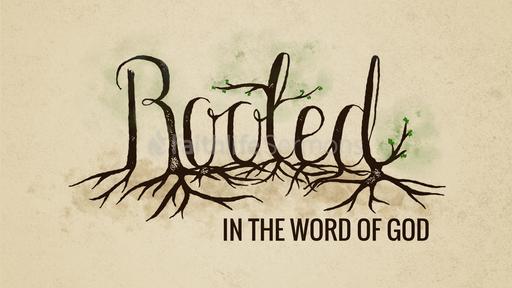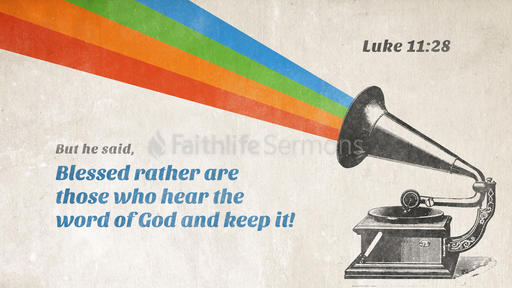NOAH & THE FIG TREE
For Certain and For Sure • Sermon • Submitted
0 ratings
· 402 viewsThough many things are uncertain from a human perspective, from God's perspective all things are for certain and for sure.
Notes
Transcript
Handout
Sermon Tone Analysis
A
D
F
J
S
Emotion
A
C
T
Language
O
C
E
A
E
Social
You may recall from the Genesis account, the story of Noah and the flood. After the waters had receded Noah sent out a dove. At first the dove could find a place to perch, and so it returned to the ark. About a week later Noah sent the dove out again, and this time it brought back in it’s mouth a fig leaf, which indicated that the ground was nearly dry enough for them to leave. The final time Noah sent out the dove, it did not return.
Based on the title for today’s message you might be tempted to think that I plan to study this incident. But that would be wrong. (After writing about this I checked the account and found that it was an olive leaf and not a fig leaf!).
Actually, the reason for the title is simply that I had to provide a title to our “secretary” by Wednesday morning, because she was leaving town on Thursday morning. And at that time I hadn’t a clue as to how I was going to present this text yet.
If you have not done so yet, please turn in your Bible to . We are continuing on in our study of the Olivet Discourse, and in this section Jesus mentioned both an olive tree, and Noah — hence the title. But the real thrust of our message is going to be on certainty and uncertainty. If had waited until the end of the week to give this message a title I would have titled it FOR CERTAIN & FOR SURE!
Though many things are uncertain from a human perspective, from God's perspective all things are for certain and for sure.
Let’s read our passage together.
The first thing I want you to note is that
There is No Uncertainty with God
Just think about how uncertainty affects the stock market.
Uncertainty is a uniquely human trait
Uncertainty is spawned by fear of the unknown
The stock market is a perfect example of fear of the unknown
Though there are many things in life which mere mortals are uncertain of, there are several things of which believers can be certain. Let’s consider
MATTERS OF CERTAINTY:
First, let’s note
The Certainty of Christ’s Return
Look with me at verses 32-34. I am one who believes in the beauty of simplicity. And Jesus, once again, shows His mastery by using a simple analogy to drive home the point of His teaching to the apostles.
Fig trees were as common in 1st Century Palestine, as corn fields and soy bean fields are in 21st Century Lenawee County
This generation
Possibly the generation of the apostles
Possibly the generation that experiences the Tribulation Period
Could it be a double fulfillment prophecy?
All these things:
Things spoken of in verses 4-31
Birth Pangs (vs. 4-5)
False Teachers
Rumors of Wars
Tribulation (vs. 10-13)
Worldwide Proclamation of the Gospel (vs. 14)
The Abomination of Desolation (vs. 15-23)
Accompanied by false signs and wonders (vs. 24)
Be prepared for:
The kingdom is near (vs. 33)
He = It
The kingdom and the person of Christ are so linked together that they are almost synonomous
The King will come unexpectedly
This is the thrust of
The King might come at any time () — our present text
The King might come after He is expected () — the parable of the faithless slave
The King might come before He is expected () — the parable of the ten virgins
Though this exhortation for preparation is for those who either lived in the first century, or for those who will live through the horrors of the Tribulation Period, still it should give us pause today to reflect on how we should prepare.
Preparation commences with salvation
Preparation continues with sanctification
Preparation concludes with glorification
As we sang this morning, Jesus’ Return is for certain and for sure. But that is not the only thing that the believer can count on being for certain and for sure.
Next, let’s note
The Certainty of the Passing Away of all of Creation
Look with me at the first phrase of verse 35. Peter wrote:
But by His word the present heavens and earth are being reserved for fire, kept for the day of judgment and destruction of ungodly men.
But by His word the present heavens and earth are being reserved for fire, kept for the day of judgment and destruction of ungodly men.
Since all these things are to be destroyed in this way, what sort of people ought you to be in holy conduct and godliness,
looking for and hastening the coming of the day of God, because of which the heavens will be destroyed by burning, and the elements will melt with intense heat!
looking for and hastening the coming of the day of God, because of which the heavens will be destroyed by burning, and the elements will melt with intense heat!
Next, let’s note
The Certainty of the Eternality of God’s Word
Look again at verse 35.
The OT gives witness to the enternality of God’s Word:
The law of the Lord is perfect, converting the soul; The testimony of the Lord is sure, making wise the simple;
The statutes of the Lord are right, rejoicing the heart; The commandment of the Lord is pure, enlightening the eyes;
The fear of the Lord is clean, enduring forever; The judgments of the Lord are true and righteous altogether.
More to be desired are they than gold, Yea, than much fine gold; Sweeter also than honey and the honeycomb.
Forever, O Lord, Your word is settled in heaven.
Your faithfulness endures to all generations; You established the earth, and it abides.
The grass withers, the flower fades, But the word of our God stands forever.
Next, let’s note
The Certainty of the Deity of Christ
There are a couple of things we should say regarding verse 36.
First, there is a small textual difference between the Greek manuscripts which Erasmus compiled — The Textus Receptus — and the Greek texts which most modern translations use. The KJV and NKJV which are based on The Textus Receptus do not contain the phrase “nor the Son.” However, does.
But of that day and that hour knoweth no man, no, not the angels which are in heaven, neither the Son, but the Father.
D. A. Carson notes that while the omission may have been prompted by the doctrinal difficulty presented by the words, it is … surprising that has not suffered similar distortion.” In other words, while theologians in the early days of the church, beginning with the 2nd century, argued over the deity of Christ, some well meaning scribes removed this statement from later copies of the Greek text, hoping to strengthen the argument for Christ’s deity.
But the Bible is very clear that during His Incarnation Jesus voluntarily surrendered the use of some of His divine attributes. Again, Carson noted:
The Expositor’s Bible Commentary, Volume 8: Matthew, Mark, Luke a. The Principle (24:36)
John’s Gospel, the one of the four Gospels most clearly insisting on Jesus’ deity, also insists with equal vigor on Jesus’ dependence on and obedience to his Father—a dependence reaching even to his knowledge of the divine.
Next, let’s note
The Certainty of the Imminent Return of Christ
Let’s look at verses 37-41 of our text. Here we come to the part of our text that deals with Noah. Christ is basically saying that for those who consider the message of the cross to be foolishness, or a stumbling block, the basic things of life will go on as they always have. People will ignore the signs of His coming and go about life as usual, just like they did in the days of Noah.
Taking a bit of liberty with this, I will say that the message of the cross is much like the building of Noah’s ark. It seems foolish to all but those who are being saved.
First, there is a small textual difference between the Greek manuscripts which Erasmus compiled — The Textus Receptus — and the Greek texts which most modern translations use. The KJV and NKJV which are based on The Textus Receptus do not contain the phrase “nor the Son.” However, does.
However, does.
And it will continue to be that way during the Tribulation Period, when Tribulation saints will give witness to the saving gospel of Christ. But they will be persecuted in various ways. And just as the people of Noah’s day were caught off guard when the flood came, so will the people who continue to reject Christ be caught off guard when He returns to planet earth to judge the nations, and establish His kingdom.
But of that day and that hour knoweth no man, no, not the angels which are in heaven, neither the Son, but the Father.
Look at verses 40-41 for a moment. Many have misinterpreted these verses as dealing with the rapture of the church. If they truly do, then it would lend credence to those who believe that the rapture of the church will be at the end of the Tribulation Period rather than before the Tribulation. But when you take everything into consideration, something we do not have time to do this morning, I believe that this passage does not deal with the rapture at all. I believe that the ones who are taken are being taken for judgment, and the ones left behind, in this instance, will be those who enter into the millennial kingdom of Christ.
D. A. Carson notes that while the omission may have been prompted by the doctrinal difficulty presented by the words, it is … surprising that has not suffered similar distortion.” In other words, while theologians in the early days of the church, beginning with the 2nd century, argued over the deity of Christ, some well meaning scribes removed this statement from later copies of the Greek text, hoping to strengthen the argument for Christ’s deity.
Note verse 42 for a moment.
But the Bible is very clear that during His Incarnation Jesus voluntarily surrendered the use of some of His divine attributes. Again, Carson noted:
The Expositor’s Bible Commentary, Volume 8: Matthew, Mark, Luke a. The Principle (24:36)
John’s Gospel, the one of the four Gospels most clearly insisting on Jesus’ deity, also insists with equal vigor on Jesus’ dependence on and obedience to his Father—a dependence reaching even to his knowledge of the divine.
Finally, let’s note
The Certainty of the Faithfulness of God
Though you may or may not be able to perceive the faithfulness of God in this text, the Scriptures speak often of it.
This I recall to my mind, Therefore I have hope.
The Lord’s lovingkindnesses indeed never cease, For His compassions never fail.
They are new every morning; Great is Your faithfulness.
“The Lord is my portion,” says my soul, “Therefore I have hope in Him.”
The Lord is good to those who wait for Him, To the person who seeks Him.
It is good that he waits silently For the salvation of the Lord.
If we are faithless, He remains faithful, for He cannot deny Himself.
Though there are many things in life which mere mortals are uncertain of, there are several things of which believers can be certain. And in these certainties, and in the One who makes them certain, we should rest!
Let’s pray!
As I close this morning I’m gonna head over the piano and sing a song for you titled YOUR FAITHFULNESS.
ADVERTISEMENT
Related Media
See moreRelated Sermons
See more

Bill Sizemore • 63 views


Ab Meerbeek • 31 views



